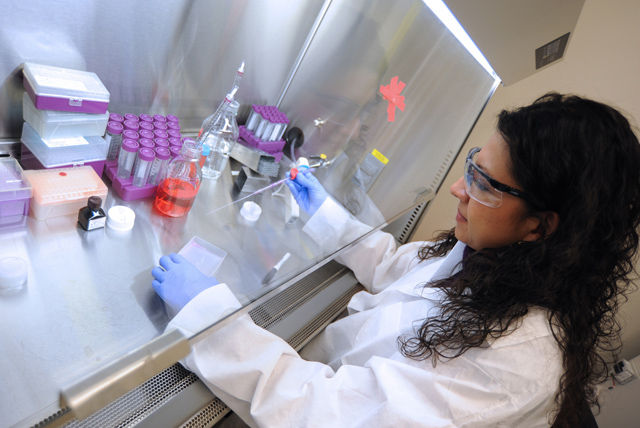In what would represent a huge step for humanity especially in the health sector, scientists are claiming that they are very close to engineering a vaccine that would make the body’s immune system fight cancer tumors like they were viruses.
A team of scientists presenting their findings in a magazine, Nature, described how they had taken pieces of cancer’s genetic RNA code, put them into tiny nanoparticles of fat and then injected the mixture into the bloodstreams of three patients in the advanced stages of the disease.
What this did was to help the subjects’ immune system produce killer T-cells that attacked the cancer cells.
The Vaccine has already been incredibly effective in battling tumors in mice, this is according to Professor Ugur Sahin from Johannes Gutenberg University in Germany and his team of researchers.
“[Such] vaccines are fast and inexpensive to produce, and virtually any tumour antigen [a protein attacked by the immune system] can be encoded by RNA,” wrote the researchers
“Thus, the nanoparticulate RNA immunotherapy approach introduced here may be regarded as a universally applicable novel vaccine class for cancer immunotherapy.”
The vaccine was tested on 3 patients in advanced stages of cancer to see how well the vaccine worked. The immune systems of the subjects reacted but there was no evidence that their cancer disappeared as a result.
In one patient, a suspected tumour on a lymph node got smaller after they were given the vaccine. Another patient, whose tumours had been surgically removed, was cancer-free seven months after vaccination.
The third patient had eight tumours that had spread from the initial skin cancer into their lungs. These tumours remained “clinically stable” after they were given the vaccine, the paper said.
The vaccine, which used a number of different pieces of RNA, activated dendritic cells that select targets for the body’s immune system to attack. This was followed by a strong response from the “killer” T-cells that normally deal with infections.
The vaccine is already causing the medical community considerable excitement. For years, certain forms of cancer have proved virtually impossible to treat but with this new vaccine whic is possible to inject into the bloodstream could prove to be a significant step forward in the fight against cancer.
The vaccine also has a very limited side effect of flu like symptoms which is far better than the terrible sickness that befalls patients during chemotherapy.
According to Professor Alan Melcher of the Institute of Cancer research, “Immunotherapy for cancer is a rapidly evolving and exciting field. This new study, in mice and a small number of patients, shows that an immune response against the antigens within a cancer can be triggered by a new type of cancer vaccine.
“Although the research is very interesting, it is still some way away from being of proven benefit to patients.
“In particular, there is uncertainty around whether the therapeutic benefit seen in the mice by targeting a small number of antigens will also apply to humans, and the practical challenge of manufacturing nanoparticles for widespread clinical application.”
Dr. Helen Rippon who is the chief executive of Worldwide Cancer research said
“We know the immune system has great potential to be manipulated and reactivated to fight cancer cells, that’s why we’ve been funding research into this for 15 years.
“These are exciting and novel results, showing the promise of an RNA nanoparticle vaccine to do just that.”
She described the immune response in the three patients as “positive” and noted that advanced skin cancer was “a notoriously difficult cancer to treat”.
“However, more research is needed in a larger number of people with different cancer types and over longer periods of time before we could say we have discovered a ‘universal cancer vaccine’. But this research is a very positive step forwards towards this global goal,” she concluded.



Leave a Reply